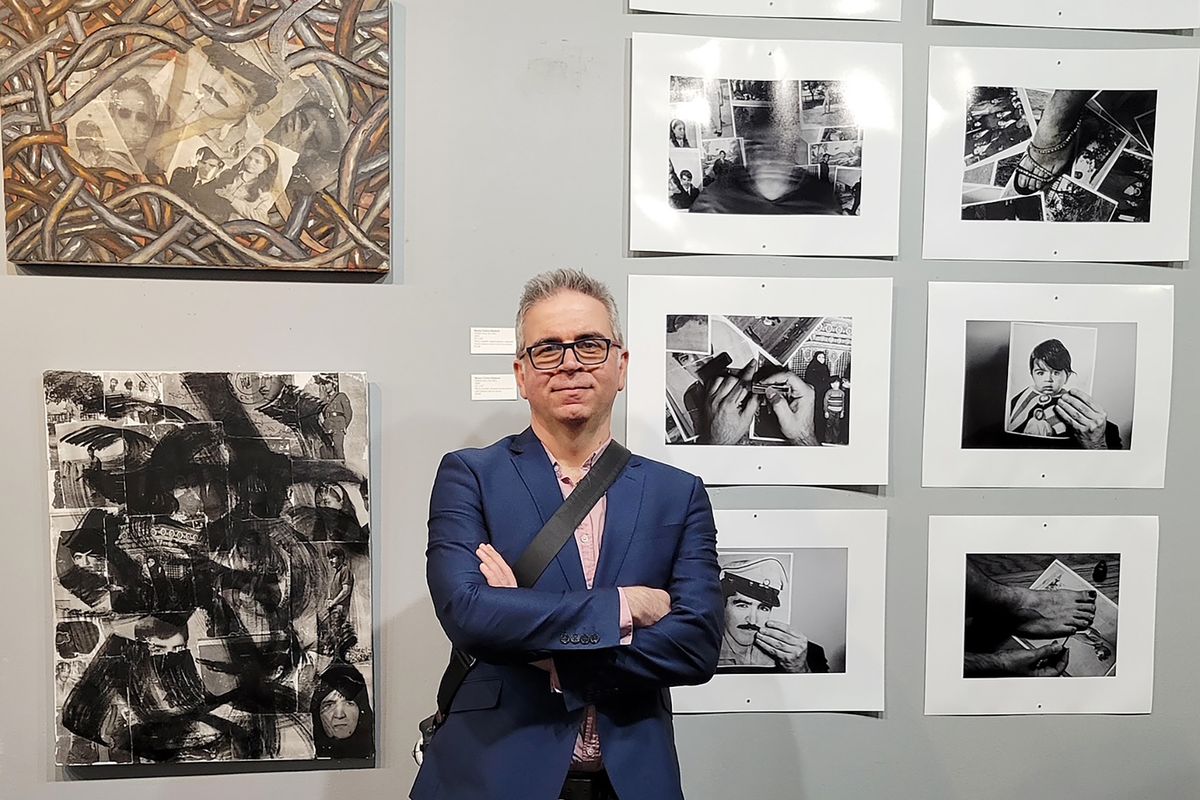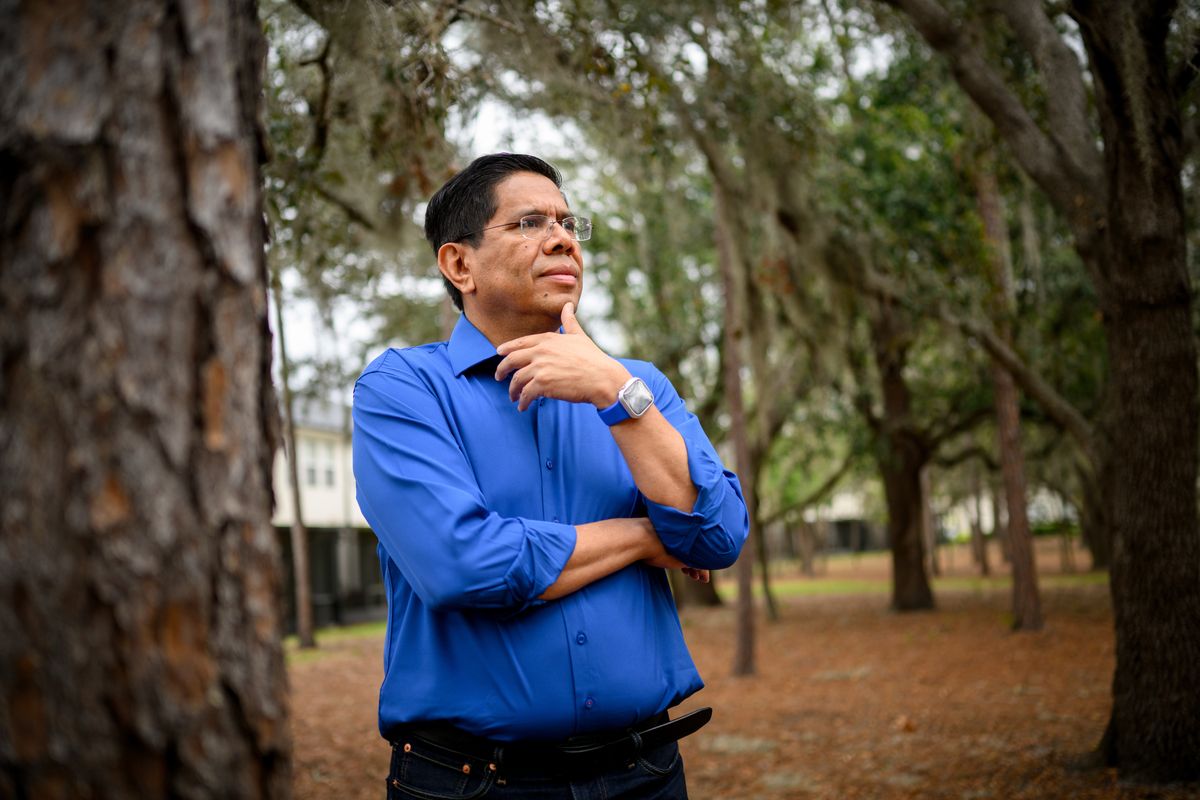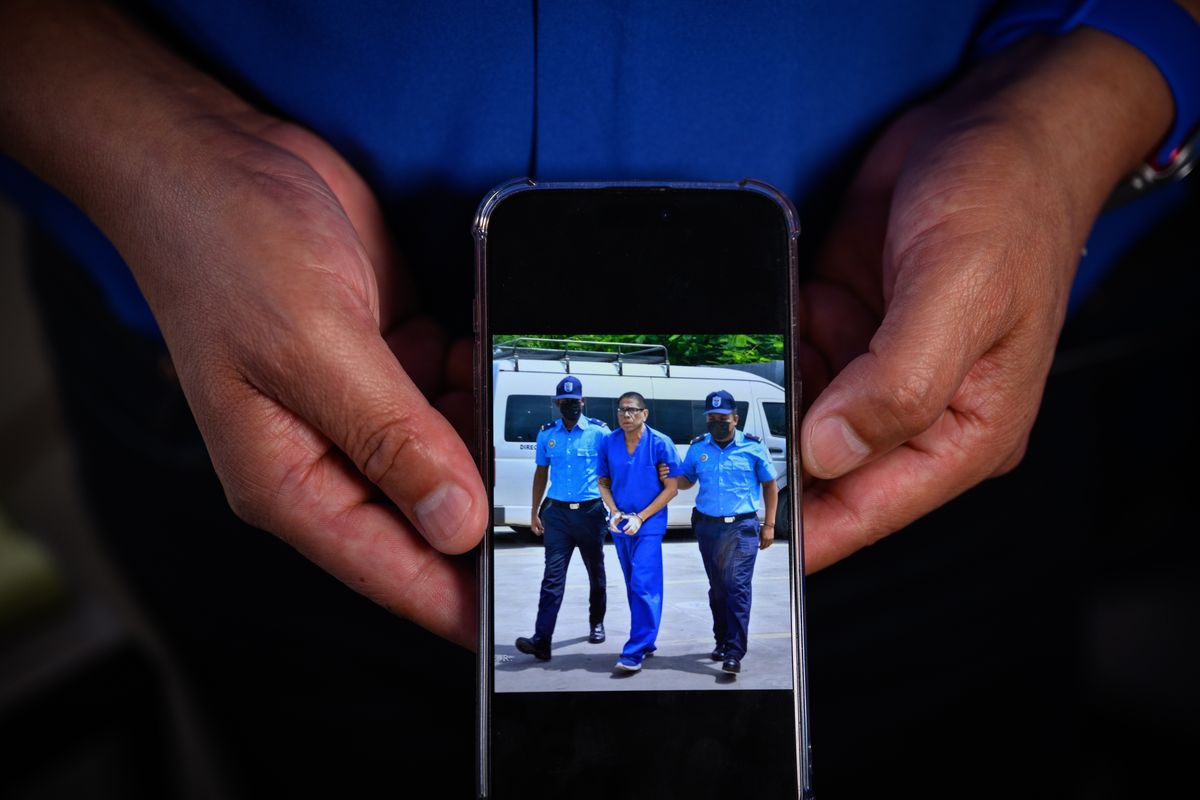They fled authoritarian countries. Here they’re experiencing déjà vu.
Miguel Mendoza, a former political prisoner in his home country of Nicaragua, lives in Florida. (Thomas Simonetti/For The Washington Post)
The fear came back in different ways.
In Austin, Texas, a Venezuelan exile sensed a familiar knot in his stomach after a newly inaugurated President Donald Trump suggested he has unfettered authority. In Chicago, an Iranian émigré was rattled by Trump’s sudden takeover of an arts center he derided as culturally “woke.” In San Francisco, a Hungarian immigrant listened with trepidation to the president’s speeches: how the country’s greatness had been lost and that he was saved by God to fix it.
All had left authoritarian countries to build new lives in the United States, a place they believed would be different. But they now see ominous patterns repeating and democratic norms eroding – and feel a duty to warn Americans.
“It honestly feels like I just switched rooms on the Titanic,” said Miguel Mendoza, a former political prisoner in Nicaragua who lives in Orlando, Florida.
The Washington Post spoke with 12 people from six authoritarian countries – some who fled left-wing regimes and others right-wing ones. They described an unsettling feeling of déjà vu in the initial months of the Trump administration: the attacks on courts and the press; the threats to universities and law firms; the hollowing out of agencies; the scapegoating and mass deportation of immigrants; the marginalizing of transgender people.
None expressed comparable concerns about Joe Biden’s presidency, when the Justice Department prosecuted Trump and his allies on charges involving the mishandling of classified documents and efforts to overturn the 2020 election. All felt Trump’s second term has been singularly different.
White House spokesperson Anna Kelly asserted in a statement Tuesday that Trump “is making our country stronger than ever before.” She said there is “no greater defender of freedom” and highlighted several actions by the president, “who signed an Executive Order to protect free speech on his first day back in office, ended the weaponization of justice, restored over 400 press passes to the White House complex, and takes media questions daily.”
Surveys suggest Americans were worrying about the state of American democracy even before Trump returned to office.
A poll last spring by the Pew Research Center found that 72% of Americans thought U.S. democracy was no longer a good example for other countries. In December, a Washington Post-University of Maryland poll found that 40% of Americans thought Trump would try to rule as a dictator – though 71% had faith that Congress and the Supreme Court would keep him from securing total power.
The Republican-controlled House and Senate have so far acquiesced to the White House, while lower federal courts have blocked some of Trump’s moves, including his attempts to end birthright citizenship and ban transgender troops. The Supreme Court, for its part, has in recent days handed the administration several temporary, procedural victories.
Steven Levitsky, a professor of Latin American studies and government at Harvard University who studies the erosion of democracies, is troubled by where the nation is headed and by what he considers the public’s high degree of complacency.
“The number of prominent CEOs, university leaders, media parent companies, law firms that have retreated to the sidelines, that have capitulated, acquiesced – that’s really dangerous,” he said. “In the United States, our civil society has the muscle, money, organization and skills to stop this right now. But we just don’t have the will.”
The early moves
Carlos Cortés witnessed the charismatic Hugo Chávez test the limits of Venezuela’s institutions after winning the presidency in 1998. The legislative branch became a rubber stamp, and the press co-opted or shut down. What followed, Cortés said, was the once “unthinkable” disintegration of one of Latin America’s oldest democracies.
“You don’t wake up one day and suddenly there’s no democracy,” he said. “We had elections, we had institutions, we had laws. … And then, little by little, everything changed.”
In 1999, Chávez pushed for a special assembly to rewrite the constitution, stretch presidential terms to six years and allow two consecutive terms. A decade later, he handily won a referendum on erasing term limits altogether.
Cortés, who was living abroad by the time Chávez died in 2013, returned briefly in 2016 to find that the country’s descent into authoritarianism had accelerated under his successor. Amid widespread hunger and skyrocketing inflation, Cortés joined hundreds of thousands of Venezuelans in fleeing. He landed in the United States, hoping for stability. He instead saw uncomfortable signs of Chavéz in Trump, who was starting his first term.
There was the same populist bravado and antiestablishment swagger. Chávez had vowed to “kill the partidocracia,” the entrenched political class. Trump promised to “drain the swamp.”
At the time, Cortés took comfort in the checks and balances of governance in America. Now he’s not so sure.
Trump recently floated the idea of a third term – something constitutional scholars agree is illegal. He has posted about impeaching judges who rule against him and punishing law firms that challenge his policies.
“It’s like I’m back home, in a very nightmarish way,” Cortés said from Texas, where he works in the technology sector. “Constantly on edge, waiting for the next thing to break.”
Nicaragua has a far different history, but Mendoza remembers when democracy was burgeoning there in the 1990s and early 2000s after a decades-long dictatorship was toppled.
“We had freedom,” he said. “We could speak out.”
Then Sandinista leader Daniel Ortega returned to power. He began striking backroom deals with business elites, scrapped term limits and silenced independent media.
Though a sports journalist by trade, Mendoza used his platform to document the government’s human rights abuses during the ensuing years. He was arrested in 2021 and accused of treasonous acts – primarily over his social media activity – spending months in solitary confinement before being convicted of “conspiracy to undermine national integrity” and “disseminating false news.”
Two years ago, he was among 222 dissidents freed and stripped of their citizenship on the condition that they board a U.S.-bound plane.
Mendoza fears the United States could be on a similar path as his native country. The Trump administration’s targeting of immigrants, and the way it has disappeared and deported some without any court hearing, remind him of how Ortega flouted due process laws. The detention of noncitizen students for social media posts hits close to home.
“That’s exactly how they came for me in Nicaragua,” he said.
Familiar rhetoric
Bence Nagy hears a familiar theme in the way Trump describes America – a nation in decline, its enemies lurking as much inside as out. To Nagy, the rhetoric tracks that of Hungarian Prime Minister Viktor Orban, an autocrat whom Trump has repeatedly praised.
“There is always some kind of existential crisis, and always, only one man who can fix it,” he noted.
As a teenager growing up in Orban’s rule, he was increasingly turned off by what he called the government’s “culture of unnecessary hatred.” It barred transgender people from changing their name or gender in official records. It went after immigrants, with billboards nationwide warning of an “invasion.”
Over time, Nagy watched as that messaging reshaped his country. Neighbors stopped trusting each other. Families – including his own – became bitterly divided over politics.
He was 19 when he moved to the Czech Republic. In 2021, he arrived in San Francisco. Nagy works there as a software engineer and wants to be optimistic about U.S. democracy’s ability to course correct.
“I’m hopeful because I have no other choice,” he said. The alternative would probably be returning to Hungary. “Which is not, definitely not, going to be better.”
Unsettling parallels
Ramin Takloo-Bighash has been in academia since he left Iran three decades ago – coming to the United States for a PhD in mathematics and freedoms that were not allowed in a country run by hard-line religious leaders.
In 2003, that included the freedom to protest the U.S. war in Iraq.
He looks back on his activism and wonders how vulnerable he would be today if still a young Princeton instructor with a green card granting him permanent resident status. He thinks of the international students who have been detained without warning by immigration officers under the Trump administration’s crackdown on pro-Palestinian student activists on campuses.
“What would have happened to me?” he wonders. The question terrifies him.
These days Takloo-Bighash is both a professor at the University of Illinois Chicago and an artist. He has two teenagers, including a son who recently asked whether he should always carry his passport because he doesn’t “look American.”
The father sees parallels between how Trump is ruling from the White House, especially with the administration’s attacks on elite universities, and the way Ayatollah Ruhollah Khomeini proceeded after taking control in Iran in 1979.
“Khomeini felt that Iranian universities had turned into a breeding ground for Western and communist influences,” Takloo-Bighash said. The higher education ministry was told to end suspect activity on college campuses, which soon after were shut down for several years. Textbooks were rewritten “to remove all mentions of what was considered un-Islamic.”
The authoritarian regime also went after cultural programming, restricting much of it. Even poetry readings were targeted, as Takloo-Bighash and a friend learned after organizing one during college. Days later, he said, the other student was called before a disciplinary committee and asked “why there weren’t more poets praising the supreme leader and the Islamic revolution and the martyrs of the revolution during the readings.”
Takloo-Bighash came to the United States and reveled in the ability to attend any artistic event he chose. “I could see an opera – it was such a treat – or go to a lecture on whatever topic without being afraid,” he said.
Such memories are now overshadowed by Trump’s moves on such cultural icons as the Kennedy Center and the Smithsonian Institution. He has accused both of “anti-American propaganda,” purging the center’s board and promising to eliminate “divisive narratives” from the Smithsonian’s museums.
“I don’t think this is the end,” Takloo-Bighash said. “Trump and his people are just getting started.”
American exceptionalism
Those who fled authoritarianism expressed a deep frustration at many Americans’ faith in the strength of U.S. democracy. To neighbors and colleagues, they have pointed out the similarities to events back home, only to be met with the same response: That could never happen here.
“Americans have this unwavering belief that their democracy is untouchable,” said Vanda Mayer, a Hungarian journalist in New York. “But they don’t see how the red line keeps getting pushed further and further away.”
Growing up in the early 2000s, Mayer dreamed of moving to the United States, which “always seemed to find a way forward.” Today she feels trapped between a country that no longer feels stable and a world running out of better alternatives.
“Where am I supposed to go?” she asked.





